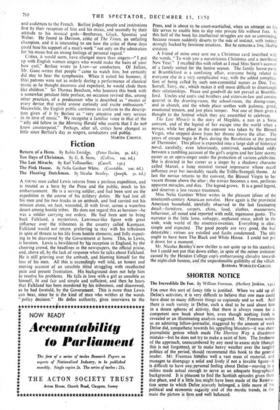Fiction
A YOUNG man called Lewis returns from a perilous expedition, and is treated as a hero by the Press and the public, much to his embarrassment. He is a serving soldier, and had been sent on the expedition in the course of his military duties. He had lost all his men and his two trucks in an ambush, and had carried out his mission alone, on foot, wounded, ill with fever, across a waterless desert among hostile tribes. He does not regard this as heroism—he was a soldier carrying out orders. He had been sent to bring back Falkland, a mysterious, Lawrence-like figure with great influence over the tribesmen in the country called Kasmaan. Falkland would not return, preferring to stay with his tribesmen in spite of threats to his life from hoitile elements, and fully expect- ing to be disavowed by the Government at home. This, to Lewis, is heroism. Lewis is bewildered by his reception in England, by the cheering crowd, the headlines in the newspapers, the official praise, and, above all, by the lack of response when he talks about Falkland. He is still grieving over the ambush, and .blaming himself for the loss of his men. All this is exceedingly well told, an honest and moving account of an unsubtle rilind struggling with recollected pain and present frustration. His background does not help him to resolve his problems. He falls in love with a girl as unsubtle as himself, fit and fair and simple and sufficient, and then he hears that Falkland has been murdered by his tribesmen, and disavowed, as he had foretold, by the Government. This is more than Lewis can bear, since he is the kind of man who writhes at the words
policy decision." He defies authority, gives interviews to the Press, and is about to be court-martialled, when an attempt on his life serves to enable him to slip into private life without fuss. In this half of the book his intellectual struggles are not so convincing, because reason suddenly deserts to the side of instinct, with instinct strongly backed by feminine intuition. But he remains a live, likable creature.
A friend of mine once sent me a Christmas card inscribed with the words, "To wish you a mei etricious Christmas and a moribund New Year." I recalled this with relish as I read Miss Stern's account of a family united for the festive season. The family house-party at Brambleford is a confusing affair, everyone being related to everyone else in a very complicated way, with the added complica- tion of being called by such non-committal names as Doe, Tan, Sorrell, Terry, etc, which makes it still more difficult to disentangle their relationships. Peace and goodwill do not prevail at Bramble- ford. Uncles and aunts and brothers and sisters-in-law and cousins quarrel in the drawing-room, the school-room, the dining-room, and in church, and the whole place seethes with jealousy, greed, emotional tension, and just plain temper. Not one of them gives a thought to the festival which they are assembled to celebrate.
The Last Miracle is the story of Megildis, a nun in a Swiss convent, and of the legend of her escape into the, world when a novice, while her place in the convent was taken by the Blessed Virgin, who stepped down from her throne above the altar. The years of escape begin in Paris during the Revolution at the period of Thermidor. This phase is expanded into a large slab of historical novel, carefully, even laboriously, contrived, sandwiched oddly between a rambling account of the girl's origins and her later stormy career as an opera-singer under the protection of various celebrities. She is directed in her career as a singer by a shadowy character called Marcel, a lame, minstrel turned impresario whose occult influence over her inevitably recalls the Trilby-Svengali theme. At last the novice returns to the convent, the Blessed Virgin to her vacant throne above the altar ; the novice becomes a nun, performs apparent miracles, and dies. The legend grows. It is a good legend, and deserves a less rococo treatment.
Miss Nelia Gardner White writes in the pleasant idiom of the nineteenth-century American novelist. Here again is the provincial American household, Carefully observed to the last fascinating detail—fu rn it u re, carpets, china, food, clothes, mannerisms, behaviour, all noted and reported with mild, ingenuous gusto. The narrator is the little lame, unhappy, orphaned niece, adrift in the wide, wide world of the nineteen-twenties. Everything is clear, simple and expected. The good people are very good, the bad detestable; virtues are extolled and faults condemned. The title ought to have been The. Black and White House. I could not put it down for a moment.
Mr. Nicolas Bentley's-new thriller is not quite up to his standard, but I could not put that down either, in spite of the minor irritation caused by the Hendon College cop's embarrassing chivalry towards the night-club hostess, and,the unpardonable gullibilty of the villain.
BARBARA WORSLEY-GOUGH.






































 Previous page
Previous page